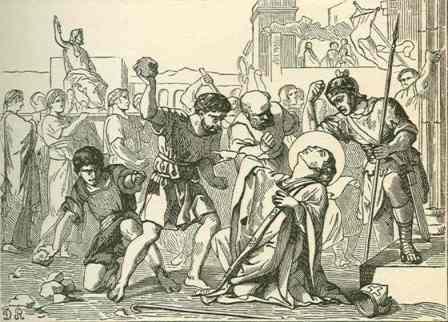 Many Episcopal Churches are named after a saint - the most common being Paul,
our patron's companion. Paul's life and works are well known - there has even
been a recent TV movie made about him, and there are dozens of books about Paul
in many bookstores - But what is the story of our own St. Timothy?
Many Episcopal Churches are named after a saint - the most common being Paul,
our patron's companion. Paul's life and works are well known - there has even
been a recent TV movie made about him, and there are dozens of books about Paul
in many bookstores - But what is the story of our own St. Timothy?Timothy was born to a Jewish mother and Greek father. His name comes from the Greek and means "Honoring God." Timothy lived up to his name - his life was spent "Honoring God" and following Jesus Christ. Timothy was well loved by Paul who called him his "dear and faithful child in the Lord", his "brother", or his �fellow worker". Paul did not often write complimentary things about other people, so his exuberant praise is especially noteworthy.
Timothy seems to have been with Paul for 17 years, since his visit to Lystra on Paul's 2nd missionary Journey, until Paul's death in Rome. A much younger man than Paul (practically a boy, perhaps in his mid teens when they first met) Timothy was introduced to Paul by his grandmother, Lois.
At first glance, it would not seem likely that Timothy would end up as a great Christian example for the ages. Timothy was by nature reserved and timid, as we see from this reference about him in 1st Corinthians: "When Timothy comes, see that you put him at ease among you, for he is doing the work of the Lord, as am I. So let no one despise him. Speed him on his way in peace, that he may return to me; for I am expecting him with the brethren." (16:10-11) Despite this, Paul nevertheless commissioned Timothy to strengthen the recalcitrant Corinthians when they wandered from the faith and loyalty to Paul, and he writes in this same vein to the persecuted Thessalonian congregation: "We send Timothy, our brother and God's servant in the Gospel of Christ, to establish you in your faith and to exhort you; that no one be moved by these persecutions. You yourselves know that this is to be our lot." (1 Thes. 3:2-3)
For all his shyness, Timothy could be trusted above many others for his pastoral concern and his gentle tact in dealing with awkward situations. When in prison, Paul wrote to the Christian community in Philippi: "I hope in the Lord Jesus to send Timothy to you soon, so that I may be cheered by news of you. I have no one like him, who will be genuinely anxious for your welfare. They all look after their own interests, not those of Jesus Christ. But Timothy's worth you know, how as a son with a father he has served with me in the Gospel." (Phil 2:19-20)
Although Timothy may have been subject to ill health or "frequent aliments" (1 Timothy 5:23) and encouraged by Paul to "use a little wine for thy stomach's sake" (This explains why he is also the patron invoked against stomachache!) Timothy seems to have been constantly ready to undertake dangerous journeys on difficult errands for Paul. At the end of his life, he deliberately stood for the faith against the pagans and in fact was murdered by them, thus showing similar courage to his mentor Paul.
Timothy grew up in Lystra, a town in Lyconia - a town visited twice by Paul and Barnabus on their first journey. On this first visit, Paul had been stoned and in fact left for dead, so the young Timothy was under no illusions as to the cost and danger of discipleship. A few years later, when Paul returned to Lystra, this time with Silas; Timothy was already a member of the Church along with his grandmother Lois and his mother Eunice. Timothy, despite being shy, despite being in delicate health, decided to answer God's call and join Paul on his dangerous and exciting journey. Paul took the young Timothy along with him on his travels over to Macedonia. The life was indeed dangerous, but also fulfilling for the young Christian, and he knew that God had called him to it, and soon he was ordained at a young age by Paul and the other early bishops.
 Timothy was placed in charge of the city of Ephesus. He met Paul again at Troas
where he celebrated the Eucharist with him before Paul sailed on to Jerusalem
and his eventual martyrdom in Rome. While imprisoned, Paul sent for Timothy to
bring him his scrolls and a warm cloak before winter set in, but we don't know
whether Timothy arrived before Paul's execution.
Timothy was placed in charge of the city of Ephesus. He met Paul again at Troas
where he celebrated the Eucharist with him before Paul sailed on to Jerusalem
and his eventual martyrdom in Rome. While imprisoned, Paul sent for Timothy to
bring him his scrolls and a warm cloak before winter set in, but we don't know
whether Timothy arrived before Paul's execution. Eusebius, a 4th century bishop and historian - whose work The History of the Church is our most complete record of the early congregations - wrote that Timothy became the first bishop of Ephesus and that he was murdered (thus martyred) at the end of January in the year 97 a.d. by a mob of drunken pagans who beat him to death with clubs and stoned him with rocks - hence his emblem of "sticks and stones" (But I have been unable to find out if his story is the foundation for the rhyme "Sticks and stones may break my bones, but words will never hurt me.")
Fr. Christopher C. Stainbrook